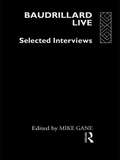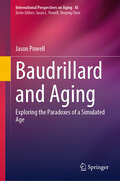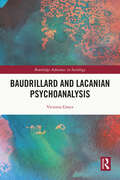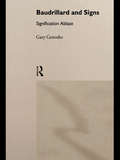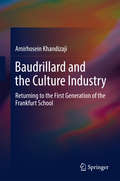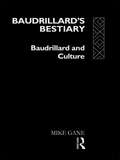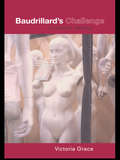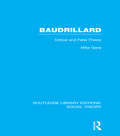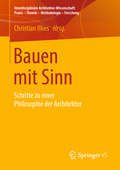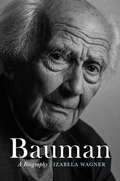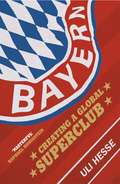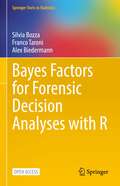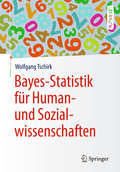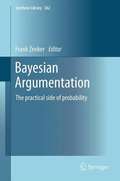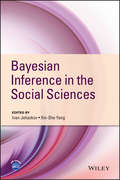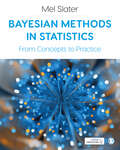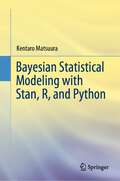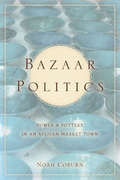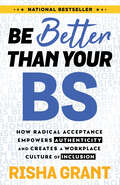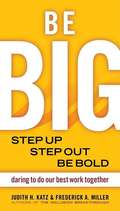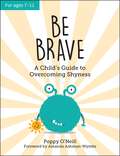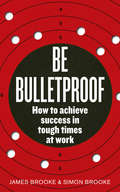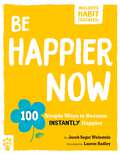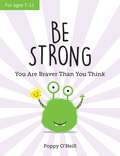- Table View
- List View
Baudrillard Live: Selected Interviews
by Mike GaneJean Baudrillard arouses strong opinions. In this collection of his most important interviews the reader gains a unique and accessible overview of Baudrillard's key ideas. The collection includes many interviews that appear in English for the first time as well as a fascinating interview and encounter between the editor and Baudrillard in Paris.
Baudrillard and Aging: Exploring the Paradoxes of a Simulated Age (International Perspectives on Aging #45)
by Jason PowellBaudrillard and Aging seeks to delve into the intricate relationship between age and society, drawing on the influential theories of French philosopher Jean Baudrillard. This book will explore how aging and the aging process are shaped by the hyperreal world we inhabit, emphasizing the paradoxical amplification of youth and the loss of authenticity in contemporary society. By analyzing Baudrillard's theories in the context of aging, this book aims to provide a fresh perspective on the challenges and paradoxes faced by individuals as they grow older. In our modern society, aging is a complex and multifaceted phenomenon that is often met with anxiety and resistance. Jean Baudrillard's original theories on simulation, hyperreality, and the collapse of meaning offer unique insights into how the aging process has been transformed and mediated within a culture that relentlessly fetishizes youthfulness. This book will examine how the hyperreal simulacra of aging are constructed, perpetuated, and imposed upon individuals as they age. It will also explore the consequences of this simulated lifecourse, including the erasure of authentic experiences of aging and the subsequent alienation and dissatisfaction experienced by older individuals.
Baudrillard and Lacanian Psychoanalysis (Routledge Advances in Sociology)
by Victoria GraceThis book is the first to develop a Baudrillardian critique of the problematic way Lacanian psychoanalysis, as a clinical practice and by extension as a source of socio-cultural and philosophical theory, continues its vain attempt to (re)animate a subject of the unconscious. The text throws into question Lacan’s notion of the ‘real,’ the unconscious ‘structured as a language,’ and his construct of surplus, while interrogating the links between psychoanalysis and Marxism. It shows how Lacanian psychoanalysis, with its questionable ethics, transpires as an endlessly recursive simulation model. Lacan’s clinical seminar was influential in the intellectual milieu of Paris while Baudrillard was writing. Although frequently referring to psychoanalysis, Baudrillard never wrote a detailed critique of psychoanalysis; the scaffolding of such a work, however, transpires throughout the extent of his writing. The text also outlines Deleuze and Guattari’s critique of psychoanalysis stressing how the alternative they propose remains within the oppressive terms of our current world. This book is an essential resource for social, critical, cultural, literary, feminist, and psychoanalytic theory. While of interest to students, researchers, and scholars of Jean Baudrillard’s work and Lacanian psychoanalysis, this book particularly addresses those for whom not all is well with psychoanalysis, opening towards renewed directions through questioning.
Baudrillard and Signs: Signification Ablaze
by Gary GenoskoThis book relates Baudrillard's work to contemporary social r4248y. The author traces the connections between Baudrillard's work and Marx and Marxism; Lefebvre and structuralist method; the works of Saussure, Bataille, Barthes, Foucault, Mauss, Peirce, McLuhan and the Prague School. The result is an authoritative and stimulating account of Baudrillard and modern social theory.
Baudrillard and the Culture Industry: Returning to the First Generation of the Frankfurt School
by Amirhosein KhandizajiThis book argues for the importance of the theory of the culture industry in today's world. It begins by considering the neglect of the culture industry in the second and third generation of the Frankfurt School, presenting historical background information and criticisms on the theories of Habermas and Honneth. In our age, the culture industry is something quite different from what Adorno and Horkheimer described or could even imagine in the twentieth century. Today, the masses can not only access the media but can also respond to the messages they receive. A key question that arises, then, is why the masses, even after gaining access to their own media, still adhere to the values of the capitalist system? Why haven't they achieved a class consciousness? This work seeks to answer those questions. Drawing on Jean Baudrillard's work, it reveals the semiotic aspects of the culture industry and describes the industry in the age of simulation and hyperreality. The book argues that the culture industry has now entered the micro level of our everyday life through shopping centers, the image of profusion and more. Further, it explores new aspects of the culture industry, such as a passion for participating in the media, the consumed vertigo of catastrophe, and masking the absence of a profound reality. As such, the book will particularly appeal to graduates and researchers in sociology and sociological theory, and all those with an interest in the Frankfurt School and the works of Jean Baudrillard.
Baudrillard's Bestiary: Baudrillard and Culture
by Mike GaneMike Gane provides an introduction to Baudrillard's cultural theory: the conception of modernity and the complex process of simulation. He examines Baudrillard's literary essays: his confrontation with Calvino, Styron, Ballard and Borges. Gane offers a coherent account of Baudrillard's theory of cultural ambience, and the culture of consumer society. And it provides an introduction to Baudrillard's fiction theory, and the analysis of transpolitical figures. The book also includes an interesting and provocative comparison of Baudrillard's powerful essay against the modernist Pompidou Centre in Paris and Frederic Jameson's analysis of the Bonaventure Hotel in Los Angeles. An interpretation of this encounter leads to the presentation of a very different Baudrillard from that which figures in contemporary debates on postmodernism.
Baudrillard's Challenge: A Feminist Reading
by Victoria GraceThis controversial book is the first systematic feminist reading of the work of Jean Baudrillard, one of the most pivotal figures in contemporary cultural theory, and is essential reading for students of feminist theory, sociology and cultural theory. Drawing on the full range of Baudrillard's writings the author engages in a debate with: * the work of Luce Irigaray, Judith Butler and Rosi Braidotti on identity, power and desire* the feminist concern with 'difference' as an emancipatory construct* writings on transgenderism and the performance of gender* feminist concerns about the objectification of women. Through this critical engagement Grace reveals some of the limitations of some contemporary feminist theorising around gender and identity, patriarchy and power, and in so doing offers a way forward for contemporary feminist thought.
Baudrillard: Critical and Fatal Theory (Routledge Library Editions: Social Theory)
by Mike GaneBaudrillard is widely recognised as a powerful new force in cultural and social criticism, and is often referred to as the ‘High Priest of Postmodernism’. This study presents a detached assessment of his social thought and his reputation, challenging the way his work has been received in postmodernism and proposing a new reading of his contribution to social theory. Using many sources currently available only in French, Mike Gane provides the keys to understanding Baudrillard’s project and reveals the extent and scope of Baudrillard’s challenge to modern social theory and cultural criticism. He looks at the sources of Baudrillard’s ideas, analysing how Baudrillard has turned these sources against themselves. He describes Baudrillard’s dramatic encounter with critical Marxist theory and psychoanalysis, showing how Baudrillard’s post-Marxist writings define, through the exploration of fatal theory, a new episode in cultural history: a period of cultural implosion. This balanced account of Baudrillard’s social theory emphasises the originality of his work and argues that his significance can only be understood by grasping the paradoxes of his project – Baudrillard’s work is poetic, yet, at the same time, critical and fatal.
Bauen mit Sinn: Schritte zu einer Philosophie der Architektur (Interdisziplinäre Architektur-Wissenschaft: Praxis – Theorie – Methodologie – Forschung)
by Christian IlliesArchitektur ist mehr als die technisch-funktionale Lösung eines praktischen Problems. In Bauwerken drückt sich immer auch ein Weltverhältnis aus - und macht zugleich ein bleibendes Sinn-Angebot. Architektur ist deswegen ein Anstoß, manchmal auch ein Apell, über sehr unterschiedliche Fragen nachzudenken, sich zu ihnen zu verhalten und sich dabei geistig zu verorten.In diesem Buch begegnen sich eine Vielfalt der Deutungs- und Annäherungsmöglichkeiten durch Vertreter unterschiedlicher Kultur- und Geisteswissenschaften. Die Eigenart der Wahrnehmungen und unterschiedlichen methodischen Herangehensweisen kommen so in ein Gespräch. Es soll zu einem besseres Verstehen, aber auch Bewerten führen. Denn wenn Bauwerke Sinn-Angebote machen, lassen sich diese auch beurteilen, da sie Ideale und mögliche Lebensweisen ausdrücken machen, die nicht alle gleichwertig sind. Der InhaltSchritte zu einer Philosophie der Architektur · Die Struktur des Raumes und die urbane Gemeinschaft · Das ‚Architektonische‘· Zur Aufgabe einer Philosophie des Bauwerks · Geometrische Muster zwischen frühneuzeitlicher Utopie und russischer Avantgarde · Moderne oder historisierende Architektur in der alten Stadt · Die Architektur des Heiligen · Meta Sudans, oder: Akustik und Geruch im antiken Rom -· Die Verallgemeinerung des Besonderen. Die Dresdner Frauenkirche und der gegenwärtige Rekonstruktionsfuror · Die Architektur der Schöpferischen Zerstörung · Architektur und Bild · Stadtbaukunst · Was ist gute Architektur? · Über Wahrheit und Lüge im architektonischen Sinn · Rekonstruktion in historischer und aktueller Perspektive · Wie gefährlich sind Rekonstruktionen? · Wie sollen wir bauen?Der HerausgeberDr. Christian Illies ist Professor für Philosophie an der Universität Bamberg.
Bauman: A Biography
by Izabela WagnerGlobal thinker, public intellectual and world-famous theorist of ‘liquid modernity’, Zygmunt Bauman (1925-2017) was a scholar who, despite forced migration, built a very successful academic career and, after retirement, became a prolific and popular writer and an intellectual talisman for young people everywhere. He was one of those rare scholars who, grey-haired and in his eighties, had his finger on the pulse of the youth. This is the first comprehensive biography of Bauman’s life and work. Izabela Wagner returns to Bauman’s native Poland and recounts his childhood in an assimilated Polish Jewish family and the school experiences shaped by anti-Semitism. Bauman’s life trajectory is typical of his generation and social group: the escape from Nazi occupation and Soviet secondary education, communist engagement, enrolment in the Polish Army as a political officer, participation in the WW II and the support for the new political regime in the post-war Poland. Wagner sheds new light on the post-war period and Bauman’s activity as a KBW political officer. His eviction in 1953 from the military ranks and his academic career reflect the dynamic context of Poland in 1950s and 1960s. His professional career in Poland was abruptly halted in 1968 by the anti-Semitic purges. Bauman became a refugee again - leaving Poland for Israel, and then settling down in Leeds in the UK in 1971. His work would flourish in Leeds, and after his retirement in 1991 he entered a period of enormous productivity which propelled him onto the international stage as one of the most widely read and influential social thinkers of our time. Wagner’s biography brings out the complex connections between Bauman’s life experiences and his work, showing how his trajectory as an ‘outsider’ forced into exile by the anti-Semitic purges in Poland has shaped his thinking over time. Her careful and thorough account will be the standard biography of Bauman’s life and work for years to come.
Bayern: Creating a Global Superclub
by Uli Hesse‘MASTERFUL’ Raphael HonigsteinThe story of superclub Bayern Munich by the critically acclaimed author of Tor!Bayern Munich is a team of extremes. They are the most passionately supported club in Germany and the most hated. There is no doubt that they are the most successful.Winners of twenty-four domestic titles since the late 1960s, they have stood at the pinnacle of European football for almost their entire existence. Through interviews with the key protagonists, Uli Hesse tells the story of this unique club. From early run-ins with the Nazis to being dubbed FC Hollywood for their egocentric stars in the 1990s up to the sensational undercover appointment of the best coach in the world, Pep Guardiola, Hesse opens the doors on Bavaria’s superpower and takes you inside Bayern Munich.
Bayes Factors for Forensic Decision Analyses with R (Springer Texts in Statistics)
by Silvia Bozza Franco Taroni Alex BiedermannBayes Factors for Forensic Decision Analyses with R provides a self-contained introduction to computational Bayesian statistics using R. With its primary focus on Bayes factors supported by data sets, this book features an operational perspective, practical relevance, and applicability—keeping theoretical and philosophical justifications limited. It offers a balanced approach to three naturally interrelated topics:Probabilistic Inference - Relies on the core concept of Bayesian inferential statistics, to help practicing forensic scientists in the logical and balanced evaluation of the weight of evidence.Decision Making - Features how Bayes factors are interpreted in practical applications to help address questions of decision analysis involving the use of forensic science in the law.Operational Relevance - Combines inference and decision, backed up with practical examples and complete sample code in R, including sensitivity analyses and discussion on how to interpret results in context.Over the past decades, probabilistic methods have established a firm position as a reference approach for the management of uncertainty in virtually all areas of science, including forensic science, with Bayes' theorem providing the fundamental logical tenet for assessing how new information—scientific evidence—ought to be weighed. Central to this approach is the Bayes factor, which clarifies the evidential meaning of new information, by providing a measure of the change in the odds in favor of a proposition of interest, when going from the prior to the posterior distribution. Bayes factors should guide the scientist's thinking about the value of scientific evidence and form the basis of logical and balanced reporting practices, thus representing essential foundations for rational decision making under uncertainty.This book would be relevant to students, practitioners, and applied statisticians interested in inference and decision analyses in the critical field of forensic science. It could be used to support practical courses on Bayesian statistics and decision theory at both undergraduate and graduate levels, and will be of equal interest to forensic scientists and practitioners of Bayesian statistics for driving their evaluations and the use of R for their purposes.This book is Open Access.
Bayes-Statistik für Human- und Sozialwissenschaften (Springer-Lehrbuch)
by Wolfgang TschirkDieses Lehrbuch erklärt verständlich, welche Vorteile die Bayes-Statistik den Human- und Sozialwissenschaften bietet, warum sie der klassischen Statistik mitunter überlegen ist und wie man sie konkret anwendet. Es beginnt bei den erkenntnistheoretischen Grundlagen der Bayes-Statistik und erklärt speziell (aber nicht nur) für die typischen Fragen der Human- und Sozialwissenschaften, wie sich diese mit einfachen Formeln behandeln lassen. Wolfgang Tschirk vermittelt überzeugend, warum die Bayes-Statistik eine Krone der Wahrscheinlichkeitsrechnung ist: Weil sie auch spärliche Informationen zu einem Problem so kombiniert, dass die Schlüsse ein Maximum an Wahrscheinlichkeit gewinnen – ein Vorteil besonders in den Wissenschaften vom Menschen, die mit ihrem Forschungsobjekt nicht beliebig experimentieren können.
Bayesian Argumentation: The practical side of probability (Synthese Library #362)
by Frank ZenkerRelevant to, and drawing from, a range of disciplines, the chapters in this collection show the diversity, and applicability, of research in Bayesian argumentation. Together, they form a challenge to philosophers versed in both the use and criticism of Bayesian models who have largely overlooked their potential in argumentation. Selected from contributions to a multidisciplinary workshop on the topic held in Sweden in 2010, the authors count linguists and social psychologists among their number, in addition to philosophers. They analyze material that includes real-life court cases, experimental research results, and the insights gained from computer models. The volume provides, for the first time, a formal measure of subjective argument strength and argument force, robust enough to allow advocates of opposing sides of an argument to agree on the relative strengths of their supporting reasoning. With papers from leading figures such as Michael Oaksford and Ulrike Hahn, the book comprises recent research conducted at the frontiers of Bayesian argumentation and provides a multitude of examples in which these formal tools can be applied to informal argument. It signals new and impending developments in philosophy, which has seen Bayesian models deployed in formal epistemology and philosophy of science, but has yet to explore the full potential of Bayesian models as a framework in argumentation. In doing so, this revealing anthology looks destined to become a standard teaching text in years to come.
Bayesian Inference in the Social Sciences
by Xin-She Yang Ivan JeliazkovPresents new models, methods, and techniques and considers important real-world applications in political science, sociology, economics, marketing, and financeEmphasizing interdisciplinary coverage, Bayesian Inference in the Social Sciences builds upon the recent growth in Bayesian methodology and examines an array of topics in model formulation, estimation, and applications. The book presents recent and trending developments in a diverse, yet closely integrated, set of research topics within the social sciences and facilitates the transmission of new ideas and methodology across disciplines while maintaining manageability, coherence, and a clear focus.Bayesian Inference in the Social Sciences features innovative methodology and novel applications in addition to new theoretical developments and modeling approaches, including the formulation and analysis of models with partial observability, sample selection, and incomplete data. Additional areas of inquiry include a Bayesian derivation of empirical likelihood and method of moment estimators, and the analysis of treatment effect models with endogeneity. The book emphasizes practical implementation, reviews and extends estimation algorithms, and examines innovative applications in a multitude of fields. Time series techniques and algorithms are discussed for stochastic volatility, dynamic factor, and time-varying parameter models. Additional features include:Real-world applications and case studies that highlight asset pricing under fat-tailed distributions, price indifference modeling and market segmentation, analysis of dynamic networks, ethnic minorities and civil war, school choice effects, and business cycles and macroeconomic performanceState-of-the-art computational tools and Markov chain Monte Carlo algorithms with related materials available via the book's supplemental websiteInterdisciplinary coverage from well-known international scholars and practitionersBayesian Inference in the Social Sciences is an ideal reference for researchers in economics, political science, sociology, and business as well as an excellent resource for academic, government, and regulation agencies. The book is also useful for graduate-level courses in applied econometrics, statistics, mathematical modeling and simulation, numerical methods, computational analysis, and the social sciences.
Bayesian Methods in Statistics: From Concepts to Practice
by Mel SlaterThis book walks you through learning probability and statistics from a Bayesian point of view. From an introduction to probability theory through to frameworks for doing rigorous calculations of probability, it discusses Bayes’ Theorem before illustrating how to use it in a variety of different situations with data addressing social and psychological issues. The book also: Equips you with coding skills in the statistical modelling language Stan and programming language R. Discusses how Bayesian approaches to statistics compare to classical approaches. Introduces Markov Chain Monte Carlo methods for doing Bayesian statistics through computer simulations, so you understand how Bayesian solutions are implemented. Features include an introduction to each chapter and a chapter summary to help you check your learning. All the examples and data used in the book are also available in the online resources so you can practice at your own pace. For readers with some understanding of basic mathematical functions and notation, this book will get you up and running so you can do Bayesian statistics with confidence.
Bayesian Methods in Statistics: From Concepts to Practice
by Mel SlaterThis book walks you through learning probability and statistics from a Bayesian point of view. From an introduction to probability theory through to frameworks for doing rigorous calculations of probability, it discusses Bayes’ Theorem before illustrating how to use it in a variety of different situations with data addressing social and psychological issues. The book also: Equips you with coding skills in the statistical modelling language Stan and programming language R. Discusses how Bayesian approaches to statistics compare to classical approaches. Introduces Markov Chain Monte Carlo methods for doing Bayesian statistics through computer simulations, so you understand how Bayesian solutions are implemented. Features include an introduction to each chapter and a chapter summary to help you check your learning. All the examples and data used in the book are also available in the online resources so you can practice at your own pace. For readers with some understanding of basic mathematical functions and notation, this book will get you up and running so you can do Bayesian statistics with confidence.
Bayesian Statistical Modeling with Stan, R, and Python
by Kentaro MatsuuraBayesian Statistical Modeling with Stan, R, and Python
Bazaar Politics
by Noah CoburnAfter the fall of the Taliban, instability reigned across Afghanistan. However, in the small town of Istalif, located a little over an hour north of Kabul and not far from Bagram on the Shomali Plain, local politics remained relatively violence-free. Bazaar Politicsexamines this seemingly paradoxical situation, exploring how the town's local politics maintained peace despite a long, violent history in a country dealing with a growing insurgency. At the heart of this story are the Istalifi potters, skilled craftsmen trained over generations. With workshops organized around extended families and competition between workshops strong, kinship relations become political and subtle negotiations over power and authority underscore most interactions. Starting from this microcosm, Noah Coburn then investigates power and relationships at various levels, from the potters' families; to the local officials, religious figures, and former warlords; and ultimately to the international community and NGO workers. Offering the first long-term on-the-ground study since the arrival of allied forces in 2001, Noah Coburn introduces readers to daily life in Afghanistan through portraits of local residents and stories of his own experiences. He reveals the ways in which the international community has misunderstood the forces driving local conflict and the insurgency, misunderstandings that have ultimately contributed to the political unrest rather than resolved it. Though on first blush the potters of Istalif may seem far removed from international affairs, it is only through understanding politics, power, and culture on the local level that we can then shed new light on Afghanistan's difficult search for peace.
Be Better Than Your BS: How Radical Acceptance Empowers Authenticity and Creates a Workplace Culture of Inclusion
by Risha GrantA book on DEI in the workplace that speaks not only to executives but to employees at all levels of a company, by award-winning diversity consultant Risha Grant.DEI consultant and corporate speaker, Risha Grant, shares her practice of learning how to welcome and embrace people&’s full humanity, without BS, full stop. What&’s BS? It&’s bullshit for sure, but more specifically it&’s the powerful and often invisible belief systems we&’ve been steeped in since birth—the judgment and bias we carry with us that impact our own lives and the many others we encounter every day. Risha teaches us about the inner work and the outer work we need to do to dismantle our &“biasphere,&” and change how we see ourselves and how we interact with others. The more people are willing to acknowledge and address the biases inherent in their belief systems, the more those biases will dissipate and the better our work environments will become.Readers will learn how to:Recognize when your BS manifests as &“isms&” and phobias that follow you to work Cure scarcity mentality, a damaging byproduct of fearValidate other people&’s experiencesBecome a real allyEngage in micro efforts that can effect change on a macro levelCreate an environment that fosters a sense of belonging for everybody; that is, &“get in where you fit in&”Abolish groupthink and create space for diverse ideasDesign explicit feedback channelsGenerate truly inclusive policies that people can trustSpot and stop bullying (it doesn&’t always look the way you think it does)Understand that equality isn&’t equity; the difference leads to everyone getting what they need
Be Big: Step Up, Step Out, Be Bold
by Judith H. Katz Frederick A. MillerToo many people have decided the safest way to get through life is to be small. They've decided it's too dangerous to think big, to speak out, to take risks. But, particularly today, organizations need people to step up.
Be Brave: A Child's Guide to Overcoming Shyness
by Poppy O'NeillAn interactive workbook for parents and children from the author of the best-selling titles Don’t Worry, Be Happy: A Child’s Guide to Overcoming Anxiety and You’re a Star: A Child’s Guide to Self-EsteemDoes your child appear nervous and isolated in social settings?Perhaps they find it difficult to approach other children or make friends?Do they seem to avoid engaging in hobbies and activities?These could all be signs that your child is struggling with shyness.This practical guide combines cognitive behavioural therapy and mindfulness methods with simple activities to help your child overcome shyness. It’s aimed at children aged 7–11 because a lot happens in these years that can impact a child’s confidence, not just now but for years to come.Your child will be guided, with the help of Jem – a friendly and supportive character they can identify with – through fun and engaging activities which are interspersed with useful tips, inspirational statements and practical information for parents.
Be Bulletproof: How to achieve success in tough times at work
by Simon Brooke James BrookeThis is the essential guide for anyone looking to get ahead in the warzone that is often the workplace.However good you are, there are always times you come under fire at work. But how do you turn a crisis into an opportunity, and make yourself bulletproof?In Be Bulletproof, business trainers James and Simon Brooke reveal the top practical solutions for strengthening your resilience – so you can bounce back from every setback, rejection or criticism. You’ll learn to be confident, positive and self-assured in the face of any office adversity.Arm yourself against workplace hazards like:- Harsh criticism and hostile colleagues- Company politics and bad bosses - Rejection and failure - Redundancy or losing your job - And – dare we say it? – your own mistakes
Be Happier Now: 100 Simple Ways to Become Instantly Happier (Be Better Now)
by Jacob Sager WeinsteinBe Happier Now gives readers 100 simple things they can do right now to make an immediate and positive difference in their lives. Plus, built-in habit trackers on the book’s inside jacket help you turn your favorite tips into lifelong habits.Decades of research shows that happiness isn’t about what you have or what you look like, but what you do. With a life-changing tip on every page, flip anywhere in this instant, browsable book to learn a new healthy skill. Backed by the latest scientific research and vetted by a professional psychologist, author Jacob Sager Weinstein provides a holistic program for creating a happy life by focusing on five key aspects:- Happy Mind- Happy Body- Happy Heart- Happy Wallet- And Happy SoulA Be Better Book: Helping readers live happier, smarter, healthier, and richer lives right now.
Be Strong: You Are Braver Than You Think: A Child's Guide to Boosting Self-Confidence
by Poppy O'NeillThis practical guide for children aged 7–11 combines proven cognitive behavioural therapy methods and fun and engaging activities, which are interspersed with useful tips, inspirational statements and practical information for parents, to help your child improve their self-confidence.
